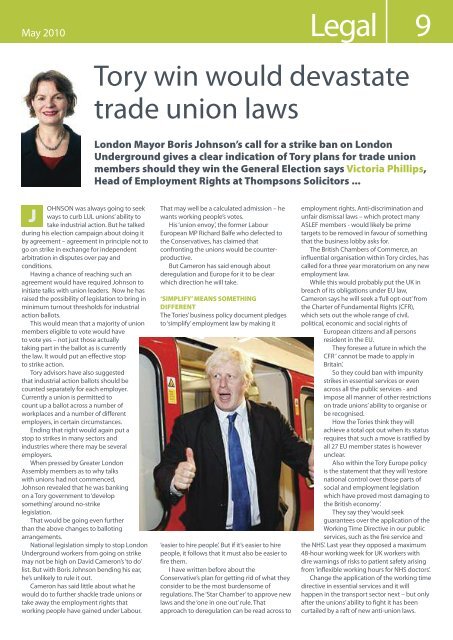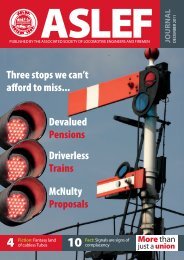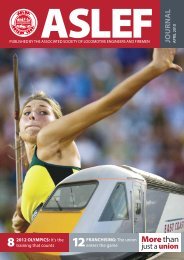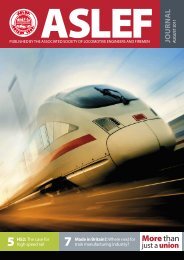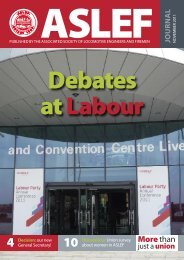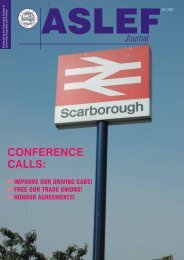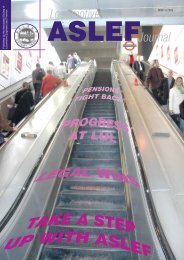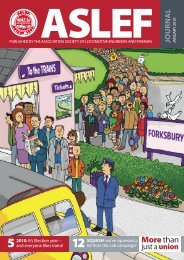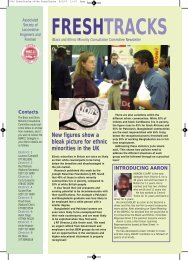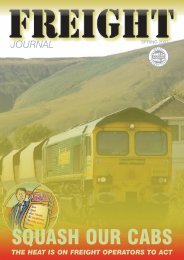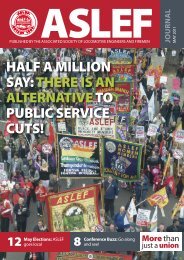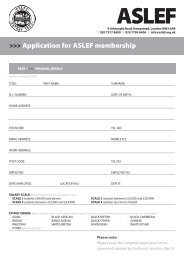Create successful ePaper yourself
Turn your PDF publications into a flip-book with our unique Google optimized e-Paper software.
Legal 9<br />
May 2010<br />
Tory win would devastate<br />
trade union laws<br />
London Mayor Boris Johnson’s call for a strike ban on London<br />
Underground gives a clear indication of Tory plans for trade union<br />
members should they win the General Election says Victoria Phillips,<br />
Head of Employment Rights at Thompsons Solicitors ...<br />
J<br />
OHNSON was always going to seek<br />
ways to curb LUL unions’ ability to<br />
take industrial action. But he talked<br />
during his election campaign about doing it<br />
by agreement – agreement in principle not to<br />
go on strike in exchange for independent<br />
arbitration in disputes over pay and<br />
conditions.<br />
Having a chance of reaching such an<br />
agreement would have required Johnson to<br />
initiate talks with union leaders. Now he has<br />
raised the possibility of legislation to bring in<br />
minimum turnout thresholds for industrial<br />
action ballots.<br />
This would mean that a majority of union<br />
members eligible to vote would have<br />
to vote yes – not just those actually<br />
taking part in the ballot as is currently<br />
the law. It would put an effective stop<br />
to strike action.<br />
Tory advisors have also suggested<br />
that industrial action ballots should be<br />
counted separately for each employer.<br />
Currently a union is permitted to<br />
count up a ballot across a number of<br />
workplaces and a number of different<br />
employers, in certain circumstances.<br />
Ending that right would again put a<br />
stop to strikes in many sectors and<br />
industries where there may be several<br />
employers.<br />
When pressed by Greater London<br />
Assembly members as to why talks<br />
with unions had not commenced,<br />
Johnson revealed that he was banking<br />
on a Tory government to ‘develop<br />
something’ around no-strike<br />
legislation.<br />
That would be going even further<br />
than the above changes to balloting<br />
arrangements.<br />
National legislation simply to stop London<br />
Underground workers from going on strike<br />
may not be high on David Cameron’s ‘to do’<br />
list. But with Boris Johnson bending his ear,<br />
he’s unlikely to rule it out.<br />
Cameron has said little about what he<br />
would do to further shackle trade unions or<br />
take away the employment rights that<br />
working people have gained under Labour.<br />
That may well be a calculated admission – he<br />
wants working people’s votes.<br />
His ‘union envoy’, the former Labour<br />
European MP Richard Balfe who defected to<br />
the Conservatives, has claimed that<br />
confronting the unions would be counterproductive.<br />
But Cameron has said enough about<br />
deregulation and Europe for it to be clear<br />
which direction he will take.<br />
‘SIMPLIFY’ MEANS SOMETHING<br />
DIFFERENT<br />
The Tories’ business policy document pledges<br />
to ‘simplify’ employment law by making it<br />
‘easier to hire people’. But if it’s easier to hire<br />
people, it follows that it must also be easier to<br />
fire them.<br />
I have written before about the<br />
Conservative’s plan for getting rid of what they<br />
consider to be the most burdensome of<br />
regulations. The ‘Star Chamber’ to approve new<br />
laws and the ‘one in one out’ rule. That<br />
approach to deregulation can be read across to<br />
employment rights. Anti-discrimination and<br />
unfair dismissal laws – which protect many<br />
ASLEF members - would likely be prime<br />
targets to be removed in favour of something<br />
that the business lobby asks for.<br />
The British Chambers of Commerce, an<br />
influential organisation within Tory circles, has<br />
called for a three year moratorium on any new<br />
employment law.<br />
While this would probably put the UK in<br />
breach of its obligations under EU law,<br />
Cameron says he will seek a ‘full opt-out’ from<br />
the Charter of Fundamental Rights (CFR),<br />
which sets out the whole range of civil,<br />
political, economic and social rights of<br />
European citizens and all persons<br />
resident in the EU.<br />
They foresee a future in which the<br />
CFR ‘ cannot be made to apply in<br />
Britain’.<br />
So they could ban with impunity<br />
strikes in essential services or even<br />
across all the public services - and<br />
impose all manner of other restrictions<br />
on trade unions’ ability to organise or<br />
be recognised.<br />
How the Tories think they will<br />
achieve a total opt out when its status<br />
requires that such a move is ratified by<br />
all 27 EU member states is however<br />
unclear.<br />
Also within the Tory Europe policy<br />
is the statement that they will ‘restore<br />
national control over those parts of<br />
social and employment legislation<br />
which have proved most damaging to<br />
the British economy’.<br />
They say they ‘would seek<br />
guarantees over the application of the<br />
Working Time Directive in our public<br />
services, such as the fire service and<br />
the NHS’. Last year they opposed a maximum<br />
48-hour working week for UK workers with<br />
dire warnings of risks to patient safety arising<br />
from ‘inflexible working hours for NHS doctors’.<br />
Change the application of the working time<br />
directive in essential services and it will<br />
happen in the transport sector next – but only<br />
after the unions’ ability to fight it has been<br />
curtailed by a raft of new anti-union laws.


